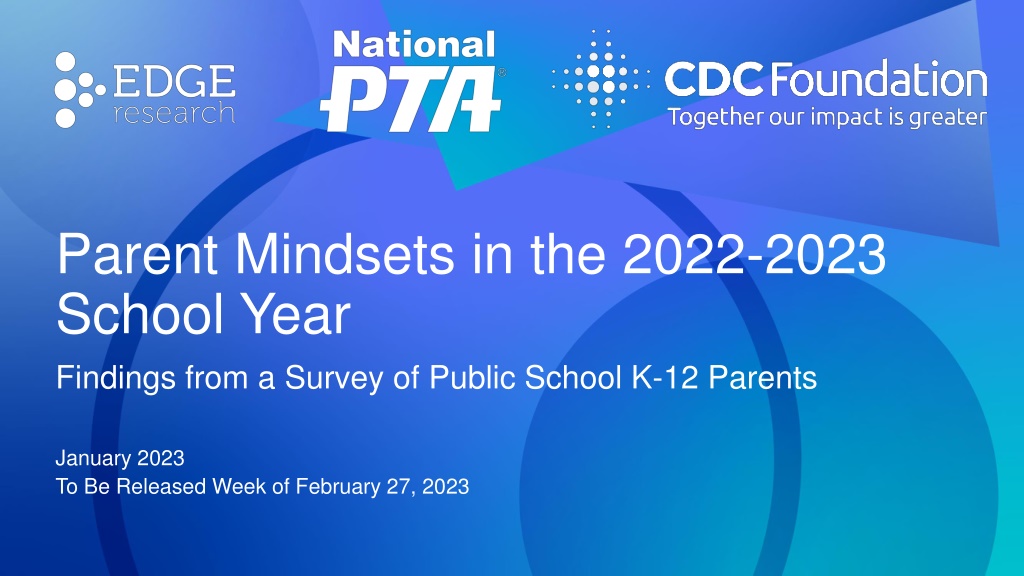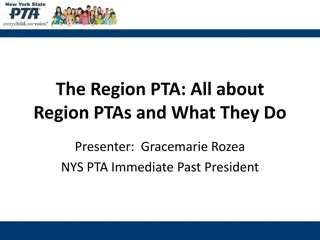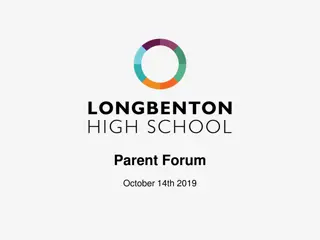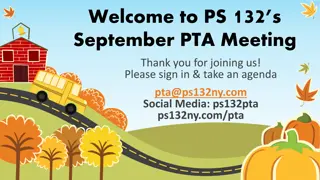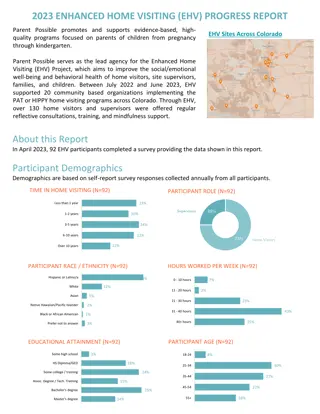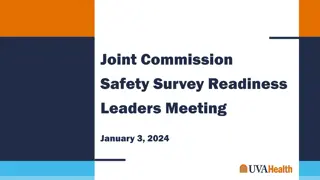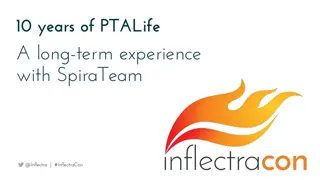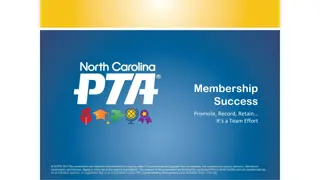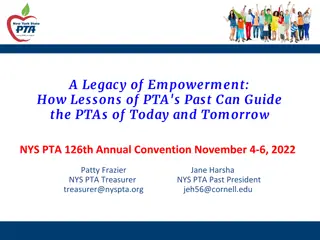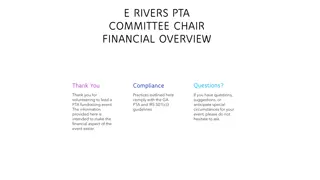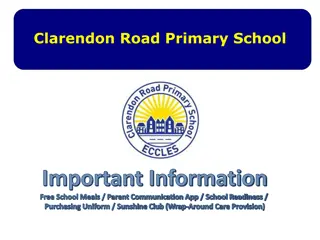Parental Mindsets in the 2022-2023 School Year Survey Findings
Survey findings from a national online parent survey conducted in January 2023 shed light on parental mindsets regarding the 2022-2023 school year. The survey, involving 1,406 parents with children in public schools, highlights key insights on pandemic recovery, parental comfort with children in school, and the pandemic outlook, with a focus on differences based on race/ethnicity.
Download Presentation

Please find below an Image/Link to download the presentation.
The content on the website is provided AS IS for your information and personal use only. It may not be sold, licensed, or shared on other websites without obtaining consent from the author. Download presentation by click this link. If you encounter any issues during the download, it is possible that the publisher has removed the file from their server.
E N D
Presentation Transcript
Parent Mindsets in the 2022-2023 School Year Findings from a Survey of Public School K-12 Parents January 2023 To Be Released Week of February 27, 2023
Methodology National Online Parent Survey: Nationwide sample of 1,406 parents and guardians with children in public school, grades K-12, including 638 elementary school parents 325 middle school parents 443 high school parents 395 Black parents 418 Hispanic parents representing a mix of acculturation levels Fielded November 29th December 15th, 2022 Offered in both English and Spanish Data were weighted to be representative of public-school parents in the U.S. This survey represents the fourth wave of a tracking study and the first wave of the 2023 survey program. Wave 1 was conducted July 23 August 8, 2021, Wave 2 was conducted November 9 24, 2021, and Wave 3 was conducted April 24th May 9th, 2022. Statistical significance indicators: Throughout this report, green/red indicates statistically higher/lower differences between audiences. Up/down arrows ( / ) indicate that Wave 1 2022 data is statistically higher/lower than Wave 3 data. NOTE: Year 1 of this project was supported by the CDC Foundation by way of the Centers for Disease Control and Prevention of the U.S. Department of Health and Human Services (HHS) and as part of a financial assistance award totaling $447,531 with more than 99% funded by CDC/HHS and $2,400, less than 1%, funded by non-government source(s). The contents are those of the author(s) and do not necessarily represent the official views of, nor an endorsement, by CDC/HHS, or the U.S. Government. Year 2 of this project was supported by the CDC Foundation by way of the Centers for Disease Control and Prevention of the U.S. Department of Health and Human Services (HHS) and as part of a financial assistance award totaling $477,893 and is 100% funded by CDC/HHS. The contents are those of the author(s) and do not necessarily represent the official views of, nor an endorsement, by CDC/HHS, or the U.S. Government. 2
Pandemic Outlook Continues to Improve Though parents of color remain less optimistic than White parents. Pandemic Outlook 43% Wave 1 (Aug. '21) Wave 2 (Nov. '21) Wave 3 (May. '22) Current (Dec. '22) 22% 14% 9% 8% The worst of the pandemic is still to come The pandemic is almost over The pandemic is over The pandemic has been overblown/ COVID-19 has never been a serious issue We re past the worst of it, but we still have a long way to go 16% 7% 5% 15% 51% Black 8% 47% 21% 13% 6% Hispanic 5% 41% 17% 24% 11% White 4
Comfort with Children in School Continues to Improve The data continue to vary by race/ethnicity, but over seven-in-ten parents of color feel at least somewhat comfortable. Comfort with Children in School Wave 1 (Aug. '21) Wave 2 (Nov. '21) 48% 82% feel comfortable with having their child at school in-person Wave 3 (May. '22) Current (Dec. '22) 34% 71% Black 9% 6% 76% Hispanic 3% 87% White Very Somewhat comfortable Neutral/Not Sure Somewhat uncomfortable Very comfortable uncomfortable 5
Rating of Schools Handling of Pandemic are Positive Among Black parents and HS parents, less so. School Rating Elem. Middle High Black Hispanic White 65% say their school has done an Excellent or Very Good job managing pandemic-related challenges. 28% 30% 27% 25% 25% 26% 35% Excellent 38% 38% 33% 34% 32% 40% 40% Very good 20% 23% 26% 17% 24% 26% 23% Good 7% 8% 11% 12% 14% 6% 8% Fair 76% feel their school is prepared to keep children safe in case of future pandemic. 2% 4% 4% 2% 2% 4% 3% Poor - 0% 0% - - 1% 0% Not sure 6
Worries are Re-Centering on the Pre-Pandemic Concerns Concern about violence at school has increased since last year. Worries Somewhat Worry a lot 53% 51% 51% 48% 47% 46% 45% 43% 43% 39% 36% 29% +4 30% 29% 26% 23% 23% 23% 22% 22% 21% 21% 19% 13% My child being bullied at school My child experiencing violence at school My child struggling socially, emotionally or mentally Schools making decisions based on false or incorrect information My child learning inaccurate or misleading information in their school curriculum My child contracting COVID-19 at school and getting sick My child being behind academically for their grade level My child contracting COVID-19 at school and infecting a family member My child experiencing racism at school My child having to follow health safety measures (e.g., wearing a mask, social distancing) Parents at my child s school pushing for policies or changes based on false or incorrect information My child being taught curriculum, topics, or viewpoints I don t agree with Growing Concern COVID Concerns Across all concerns, Hispanic parents are significantly more worried than Black and White parents. 7
Most Parents See Improvement Over Last School Year But, perhaps not as much as parents anticipated at the end of last school year. This School Year, Compared to Last School Year 40% 40% 36% 36% Prediction Reality 22% 18% 4% 4% 2% 1% A lot better than last school year Somewhat better than last school year The same as last school year Somewhat worse than last school year Much worse than last school year Hispanic parents (43%) 8
Accessing Mental Health Supports through Schools
Parents Say Mental Health Support Important, but Elusive Few parents are very confident they would know how to find resources through their school to support their child s mental health. Confidence in Who to Ask for Mental Health Support for Child Black Hispanic White 37% 74% of parents say it is Very Important to have programs and policies to address and provide emotional and mental health support. Very confident 38% 36% 44% 47% 47% 45% Somewhat confident 42% 45% 48% 12% 7% Not confident 11% 10% 13% Mental Health Support 3% 0% 2% 2% 7% Not sure Information Overall (from Oct. '22 PTA National Standards Survey, same audience) 10
Parents are Most Comfortable Reaching Out to Teachers Comfort is higher with parents of color. No staff member tested garners strong comfort from a majority of HS parents. % Very Comfortable Comfort Reaching Out Elem. Middle High Black Hispanic White Very comfortable Somewhat 51% 45% 57% 55% 53% 59% My child s teacher 53% 90% School nurse 44% 84% 43% 48% 43% 46% 43% 52% School counselor 44% 85% 41% 48% 44% 46% 41% 54% School psychologist 36% 74% 35% 34% 46% 42% 33% 43% School social worker 35% 73% 36% 36% 33% 46% 43% 31% 11
Parents Show Overwhelming Support for Mental Health Resources and Services in Schools Do you support or oppose the idea of schools providing resources and services to support [your child s/ its students ] emotional and mental health? 88%Support for Either Version 65% Your Child Students 62% 26% 23% 9% 9% 2% 0% 1% 0% Strongly support Somewhat support Neutral Somewhat oppose Strongly oppose For Black parents, support is 7 pts higher for your child compared to students . NOTE: Questions split-sampled 12
Despite Such Support, Few See More Mental Health Supports Now And, funding sources are unclear. Source of Funds for Increased Mental Health Support (among those who say MORE) Amount of Resources or Programs for Students Mental Health With funds the school received for the pandemic 30% 46% With regular school funding 31% 26% 17% With funds or grants from an outside organization 6% 16% FEWER programs or resources than before Same amount of programs or resources MORE programs or resources than before Not sure 29% Not sure Only 32% overall are even aware their school has received any COVID funding for any purpose. 26% HS Parents 23% Small Town/Rural Parents 13
Parents Support Schools Identifying Areas Where Students Could Use Mental and Emotional Health Support Emotional or Mental Health Evaluations in Schools Less than half have evaluations. 58% say No or Don t know The vast majority (91%) who do have them OPT-IN (or don t have the option to opt out) 42% Say School Has Evaluations 66% of those can opt out Most who DON T have evaluations would want them. 66% WOULD want their child evaluated 89% of those OPT-IN In other words, most parents support evaluation. 14
Support for Sharing the Information from Evaluations is Mixed Parents most want to be informed of how their child is doing. Elem. Middle High Black Hispanic White Student Info Use Inform parents of how their child is doing emotionally/mentally 61% 62% 56% 62% 53% 61% 60% Connect students/families with resources at school to support emotional/mental health 52% 54% 51% 51% 50% 52% 57% Connect students/families with resources outside of school to support emotional/mental health 51% 50% 48% 55% 57% 43% 53% Inform child s teacher(s) of emotional/mental health considerations that might impact needs in the classroom 50% 53% 52% 43% 53% 43% 53% 15
Parents Desire to Know Outweighs Student Privacy High school parents are more torn on this issue. Parents Rights vs. Student Privacy Strongly Agree Somewhat Agree Elem. Middle High Black Hispanic White Parents have a right to know what their child discusses with school counselors, school psychologists, or staff 53% 83% 86% 83% 77% 83% 86% 80% Students have a right to privacy when it comes to what they discuss with school counselors, school psychologists, or staff 43% 77% 76% 83% 75% 75% 79% 78% 64% agree more with the idea of parents right to know 16
Parents Express the Desire for Help on Many Fronts But a few key themes emerge from their comments. Key Resources Mentioned: Resources the school should offer are having both a counselor and licensed psychologist available on staff for a child to talk to. In-school counselor or psychologist There should be more communication and support for parents, because most of the time there are meetings, it s to solve issues, but they always say the same thing and never do anything. The issues continue and grow because of a lack of sincerity and clarity towards parents. We never reach a compromise, and nothing ever gets solved. (Translated from Spanish) Referrals to external providers Keep parents informed and involved Integrate interventions in the school day Focus on Adversity. Adversity poverty, housing and food insecurity, abuse, or neglect produces toxic stress that affects learning and behavior, but how schools respond matters. Positive, stable relationships when adults have the awareness, empathy, and cultural competence to understand and listen to children can buffer the effects of even serious adversity. Address the underlying causes 17
For Certain Topics, Description > Jargon/Edu-Speak Parents offer more support for key educational topics when concepts are described, rather than using umbrella terms. Importance of Policies or Programs to Address Each (% very important) 76% 75% 72% 69% 59% 53% Social and emotional learning Teaching social skills like respect, cooperation, perseverance, and empathy Diversity and inclusion Making sure all students feel seen, heard, and included Sexual health education Health education NOTE: Questions split-sampled 19
Parents Support Teaching Content on Race in Schools % A lot/some How Much Should Be Taught Elem. Middle High Black Hispanic White A lot Some History of racism or discrimination based on race or ethnicity in the United States 77% 77% 78% 76% 80% 72% 43% 87% Existing racism or discrimination in the United States 73% 74% 72% 74% 81% 67% 86% 42% Slavery in the United States 74% 72% 73% 78% 75% 70% 83% 40% Segregation or the separation of people by race in the United States 74 73% 71% 82% 77% 71% 73% 40% 20
Most Parents Believe These Topics Should be Introduced by the Fifth Grade Majority Support Discussing Topic in This Grade or Earlier Lowest Grade It Is Appropriate For Schools To Discuss Each Topic ES MS HS Not at all History of racism or discrimination based on race or ethnicity in the United States 60% 23% 7% 10% Fifth Grade Fifth Grade Slavery in the United States 59% 23% 6% 12% Segregation or the separation of people by race in the United States Fifth Grade 59% 21% 5% 15% Existing racism or discrimination in the Fifth Grade 57% 21% 8% 14% United States 21
Parent Comfort with Teaching Sexual Health Topics Varies % A lot/some Elem. Middle High Black Hispanic White How Much Should Be Taught A lot Some 80% 80% 83% 85% 81% 86% Safe touch and physical boundaries 83% 51% 80% 78% 82% 80% 82% 80% Consent and healthy relationships 80% 47% Puberty and body changes between childhood and adulthood 81% 82% 80% 79% 79% 86% 81% 42% 72% 70% 75% 72% 77% 72% Sexuality/sexual health education 73% 34% 52% 53% 60% 64% 49% 60% Sexual orientation 54% 24% Gender identity or expression, including transgender and non-binary identities 51% 49% 55% 54% 61% 47% 52% 22% 22
Parents Think Sexual Health Ed Starts with Bodily Autonomy and Safety Majority Support Discussing Topic in This Grade or Earlier Lowest Grade It Is Appropriate For Schools To Discuss Each Topic ES MS HS Not at all Fourth Grade 66% 20% 6% 8% Safe touch and physical boundaries Puberty and body changes between childhood and adulthood 53% 33% 6% 8% Fifth Grade 46% 34% 11% 9% Sixth Grade Consent and healthy relationships 39% 39% 10% 12% Sexuality/sexual health education Sixth Grade Gender identity or expression, including transgender and non-binary identities 34% 23% 8% 35% Seventh Grade 33% 30% 10% 27% Sexual orientation Seventh Grade 23
Understanding the Dynamics of Dis-/Mis-Information
Definitions Included in the Survey Misinformation Disinformation False or incorrect information that is shared or spread by people who believe it is correct. False or incorrect information that is shared or spread by people who know it is false but share it anyway. 25
Most are Concerned (Somewhat) about Mis/Disinformation But concern is soft and does not vary across impact levels. % Very Concerned Concern about Mis/Disinformation Impact on Black Hispanic White Very Somewhat 39% 40% 29% 75% 33% Education policies in your state 36% 25% 43% 70% 31% Your child s school 42% 47% 31% 73% 37% Your child 26
Few Would Disengage Over Mis/Disinformation Discuss issues or questions with teachers or staff at your child s school Attend open meetings at your child s school to discuss issues, policies, or curriculum 53% 52% 40% 40% 5% 5% More likely Same, no change Less likely More likely Same, no change Less likely White parents (49%) White parents (44%) 27
Strong Concern is Low on All Topics Included in the Survey Concern about Mis/Disinformation Impacting Each Somewhat concerned Very 77% 73% 73% 72% 71% 69% 37% 37% 37% 35% 34% 34% Emotional and mental health in schools Issues relating to sexual orientation or gender identity (LGBTQ issues) in schools Race and ethnicity and how they are taught in schools Vaccine policies in schools COVID-19 vaccine policies Sexual health education in schools 28
TV News and Social Media are Leading Sources of Information for Parents Sources of Information Black 38% 37% 34% 31% 20% 24% 12% 15% 10% 9% 5% 5% 6% 5% 2% 1% 2% Hispanic White 36% 42% 23% 27% 25% 23% 10% 12% 9% 8% 4% 8% 6% 3% 3% 2% 3% 38% Local TV news Social media 39% 30% 34% 27% 25% 25% 12% 10% 12% 8% 8% 5% 5% 5% 2% 2% 6% 33% 31% 28% 24% 24% Network TV news (e.g., CBS, NBC, ABC) Cable TV news (e.g., Fox News, CNN, MSNBC) Online news sites Family, friends, or neighbors Local newspapers or their websites Morning news programs National newspapers or their websites 12% 11% 11% 8% 7% 6% 6% 4% 2% 2% 4% Talk radio Public Radio/NPR Public Television/PBS Online discussion forums Place of worship or faith/religious community Blogs Other None of these 29
Trust Remains a Tough Measure and is Highest for Known Professionals Trust on School-Related Issues Trust Somewhat Completely 92% 90% 87% 85% 84% 80% 77% 70% 56% 49% 45% 34% 41% 34% 27% 23% 21% 20% 16% 15% 11% 9% 9% 9% Pediatricians Your TeacherYour Prinicpal Local parent/ School District National PTA Federal government agencies or officials who work on ed. issues Other parents you know Information shared by someone you know online or on social media National politicians Local politicians Information shared by someone you don t know online or on social media teacher org 30
Top Takeaways Parents comfort level with in-person schooling and their overall pandemic outlook continue to improve. However, this comfort remains uneven across key subgroups, especially among parents of color. Parents concerns, however, remain relatively consistent year-over-year, with the exception of school violence. This is the only concern that garners a statistically significant increase since the last wave of the survey, fielded in April/May 2022. 1 Parents value and emphasize mental health supports for students, and most support schools conducting mental health evaluations of students to support their well- being. Parents want information gathered and shared with them so they can be part of the solution supporting their child s mental health. 2 The data also reveal, though, that parents have difficulty finding existing mental health supports in schools. Less than four-in-ten parents are very confident they know whom to ask at school if their child needs mental health supports, and a majority believe mental health supports offered by their child s school have remained unchanged or decreased compared to before the pandemic. Further, few know of funding changes associated with such supports. 3 Parents currently show some worry about mis- or dis-information around education, but parents need to know more about these issues and their potential impacts to elicit significant, stronger concerns about these topics. 4 32
For additional information, please contact: Adam Burns| burns@edgeresearch.com Karen Emmerson | emmerson@edgeresearch.com Claudia Calicho-Mamani | calicho@edgeresearch.com Edge Research 1560 Wilson Blvd, Suite 475 Arlington, VA 22209 www.edgeresearch.com
Parent-Reported Vaccine Status of Their Children 61% Agree COVID- 19 vaccines are necessary to prevent spread Child s COVID-19 Vaccination Status 36% 36% 21% 72% Say their child has received or will receive the flu shot this season 8% Fully vaccinated & received at least 1 booster Other Has not received the vaccine 35
Concerns by Race/Ethnicity % Worry A Lot + Some Total Black Hispanic White My child being bullied at school 51% 46% 47% 67% My child experiencing violence at school 53% 52% 48% 68% My child struggling socially, emotionally or mentally 51% 41% 49% 63% Schools making decisions based on false/incorrect info My child learning inaccurate/misleading info in their school 48% 46% 42% 66% 45% 43% 40% 62% curriculum My child contracting COVID-19 at school and getting sick My child contracting COVID-19 at school and infecting a family 46% 51% 38% 62% 43% 51% 35% 61% member My child being behind academically for their grade level Parents at my child s school pushing for policies/changes based on 43% 37% 38% 59% 47% 43% 43% 61% false/incorrect info My child experiencing racism at school 36% 47% 23% 59% My child being taught curriculum, topics, or viewpoints I don t agree 39% 36% 35% 52% with My child having to follow health safety measures 29% 29% 24% 42% 36
Trust Differences across Race and Party Affiliation How much would you trust each of the following sources when it comes to their perspectives on school-related issues? % Trust Completely + Somewhat Total Black Hispanic White Democrat Independent Republican Pediatricians Your Teacher Your Principal 92% 90% 87% 84% 85% 77% 89% 91% 86% 87% 81% 84% 92% 91% 88% 83% 85% 75% 89% 88% 85% 81% 80% 73% 93% 92% 86% 84% 84% 73% 93% 89% 87% 85% 89% 80% 94% 94% 91% 88% 91% 87% Local parent/teacher org School District National PTA Federal government agencies or officials who work on ed. issues Other parents you know Info shared by someone you know online/on social media Info shared by someone you don t know online/on social media 70% 76% 78% 66% 66% 56% 86% 80% 82% 75% 81% 82% 77% 84% 56% 55% 54% 53% 54% 65% 64% 34% 45% 41% 29% 28% 33% 42% National politicians Local politicians 45% 49% 54% 54% 53% 54% 39% 47% 36% 41% 38% 46% 62% 64% 37
